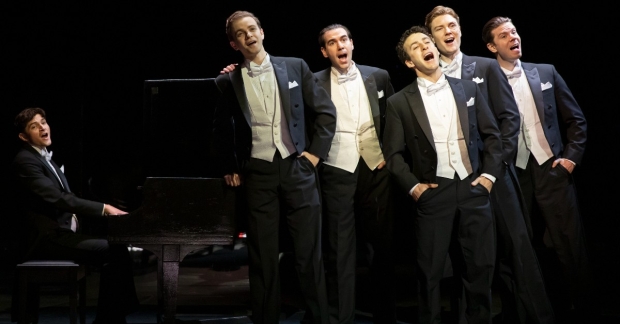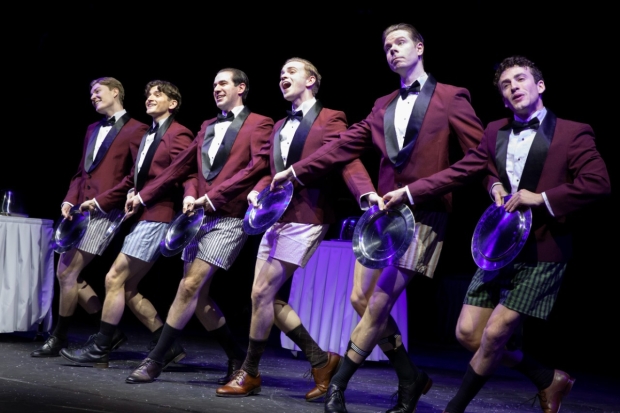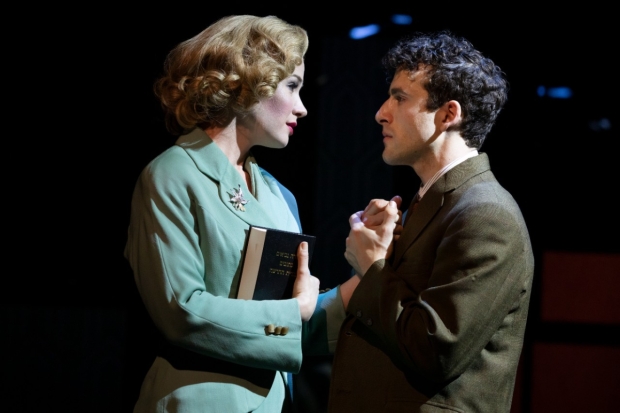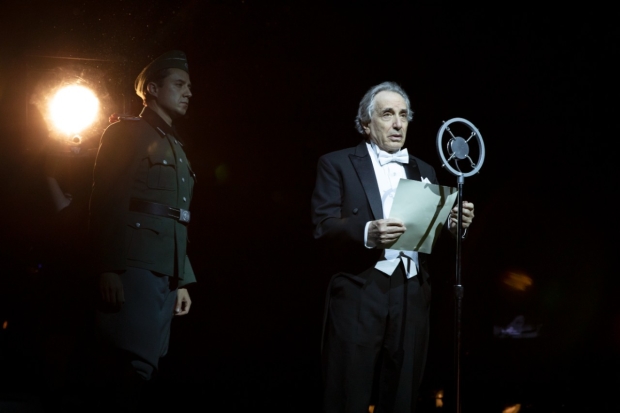Review: Harmony Lets Comedy Sing in the Unlikeliest of Settings

(© Julieta Cervantes)
Of all the things the Nazi Party managed to destroy, art encompasses the haziest of the losses. Not only because the so-called "degenerate" work that was stolen or demolished will never be fully reclaimed, but because a culture can never know what it would have been had those silenced voices been allowed to sing.
Of course, it would make for easy melodrama to pick out the most profound and rebellious voice in the bunch and tearfully reflect on how mankind was deprived of its life-changing effects. But what are the simple, joy-making entertainments worth to humanity? Harmony, a musical by pop icon Barry Manilow (music and arrangements) and his frequent collaborator Bruce Sussman (book and lyrics) about the Comedian Harmonists, a world-famous singing group dissolved and erased from history by the Nazi regime because of its three Jewish members, proves that joy is worth a lot — first by delivering it in spades and then by showing the heartbreak rendered by its destruction.
Harmony, finally receiving its New York debut with the National Yiddish Theatre Folksbiene, has been in the musical theater ether since the late '90s when the show premiered at La Jolla Playhouse. It's had New York aspirations since the beginning, re-emerging at various regional houses in the ensuing decades, but commercial hesitations are certainly understandable when you have a production that blends musical comedy with World War II drama. Under the supervision of Tony winner Warren Carlyle, however, Harmony's dichotomous DNA feels…well, harmonious. As both choreographer and director, Carlyle's production draws out the show's winking charm and bubbling physicality not to offset the ultimately tragic storyline, but to harness that ancient Jewish aptitude for laughing through pain and entertaining through hardship.

(© Julieta Cervantes)
We see the central sextet of vocalists come together in the opening montage, which toggles between a 1927 audition sequence in Berlin and a 1933 Carnegie Hall performance. Their jump from renegade singers to the Backstreet Boys of interwar Europe happens quickly, but the extraordinary ensemble of triple threats makes this rapid rise to stardom plenty convincing. Tenor buffo Harry Frommermann (Zal Owen) is the group's architect who places an ad for the remaining members and ends up with a motley crew of gentlemen: Bulgarian first tenor Ari "Lesh" Leschnikoff (Steven Telsey); second tenor and medical school dropout Erich Collin (Eric Peters); bass Robert "Bobby" Biberti (Sean Bell); plucky Polish pianist Erwin Bootz (Blake Roman), who takes the cheeky nickname "Chopin"; and Roman Cycowski (Danny Kornfeld), a trained cantor who goes by the name "Rabbi" and came to Germany after ducking the Polish pogroms. Harry, Erich, and Rabbi are the group's three Jewish members, a fact that is at first overlooked by a government grateful for their positive German ambassadorship, but eventually leads to their forced disbandment and the destruction of nearly all their films and records.
Early on, we find that these scenes are merely shadows of the past (set designer Beowulf Boritt crafts a neutral, shadowy space, fit for a memory play). We bear witness to alternatingly joyful and painful reminiscences conjured by a modern-day Rabbi, played by the phenomenal Chip Zien (the real-life Cycowski died in 1998 at the age of 97, so as the last surviving member, he assumes storytelling responsibilities). Most of the unsullied joy is packed into Act 1 where we get to see the Comedian Harmonists in their element. We sample their signature vocal imitations of musical instruments in a number that captures their physical comedy in silhouette, as lit by Jules Fisher and Peggy Eisenhauer.
In another number, Carlyle pulls out all the bells and whistles of choreography, props, and stage business, while costume designers Linda Cho and Ricky Lurie dress the group in matching waiter uniforms from the waist up, with a tad more variety from the waist down in a bit of pantsless comedy. Zien often narrates from the sidelines but also jumps into the story as whimsical versions of various celebrities who crossed paths with Comedian Harmonists during their brief run in the spotlight (I won't spoil the cameos but they give wig designer Tom Watson a host of delightful tasks).

(© Julieta Cervantes)
Another focal point of Rabbi's memory is his wife Mary (the always lovely Sierra Boggess), a Christian woman who decides to convert to Judaism to marry him, despite the growing risks (Harry, meanwhile, takes on a similar risk by marrying a Jewish and actively political woman named Ruth, played by Jessie Davidson). While these relationships add some personal stakes, the characters of Mary and Ruth unfortunately remain the saggiest parts of the musical. Mary is little more than a paragon of kindly virtue, whose one moment of hesitation is quickly overturned by Rabbi's love song "Every Single Day" (admittedly, an enchanting song performed beautifully by Kornfeld). Even so, I'll never turn down an opportunity to hear Boggess's stunning soprano.
Despite this smidge of dramatic clunkiness in Act 1, Harmony hits its stride in Act 2 after the Comedian Harmonists pass up an opportunity to stay in New York and return to home Germany — a haunting memory for Rabbi, which Zien retells with equally haunting regret.
Sussman's book feels authentic and specific, while Manilow's music bears only vague traces of his own discography — a rarity for solo artists who turn from hit-making to storytelling. The title Harmony certainly contains a bit of preciousness in its allusion to harmony on a global political scale. And yet, the show's greatest triumph is its refusal to grab at the low-hanging fruit of sweeping moralizing and sanctimonious prognosticating. When you cut out all that fat, it turns out you're left with plenty of room for good old-fashioned entertainment — even in a story that dares to not have a fairytale ending.

(© Julieta Cervantes)











